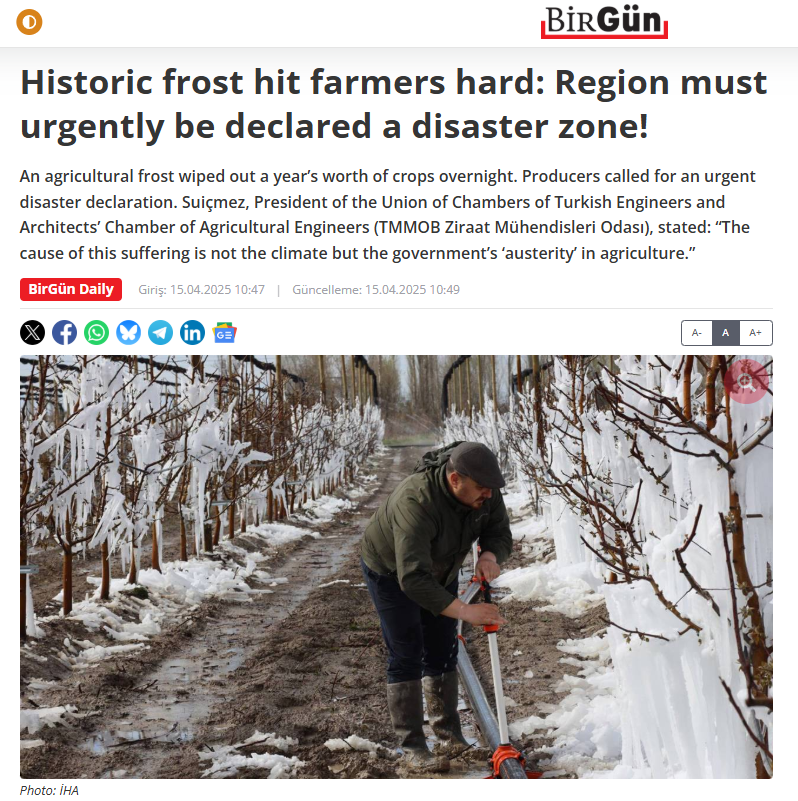BİRGÜN GAZETESİ: HİSTORİC FROST HİT FARMERS HARD: REGİON MUST URGENTLY BE DECLARED A DİSASTER ZONE! - 15 NİSAN 2025

An agricultural frost wiped out a year’s worth of crops overnight. Producers called for an urgent disaster declaration. Suiçmez, President of the Union of Chambers of Turkish Engineers and Architects’ Chamber of Agricultural Engineers (TMMOB Ziraat Mühendisleri Odası), stated: “The cause of this suffering is not the climate but the government’s ‘austerity’ in agriculture.”
Agricultural production across almost the entire country has been struck by frost. While the effects of a frost event in February had not yet subsided, another wave of frost impacting 36 provinces has dealt a heavy blow to producers. The frost, which hit Malatya, Elazığ, Denizli, Manisa, Uşak and many parts of the Black Sea region, caused damage of up to 100% in orchards and fields growing apricots, grapes, hazelnuts and citrus fruits.
While producers have long been suffering under agricultural policies they have demanded to be changed, President of the Union of Chambers of Turkish Engineers and Architects’ Chamber of Agricultural Engineers (TMMOB Ziraat Mühendisleri Odası), Baki Remzi Suiçmez, called for the immediate declaration of disaster zones in affected provinces and insisted that the losses of farmers not covered by the Agricultural Insurance Pool (TARSİM) must be compensated by the state.
FROST WILL ALSO IMPACT PRICES
Suiçmez said, “The frost caused serious damage to a variety of crops, from apricots to hazelnuts, apples to potatoes, sugar beet to grapes. Inevitably, this will lead to a shortage of fruit and vegetables in the market, causing prices to rise domestically. Additionally, apricots, hazelnuts, grapes, and many vegetables are products we produce in surplus and export abroad. So, a drop in export income may also occur. We’re also experiencing drought, as we did last autumn, and it's likely to be even more of an issue in the summer months. Unfortunately, due to insufficient precautions particularly around irrigation drought will again cause domestic prices to rise,” he summarised.
YOU CAN’T TIGHTEN THE BELT ON DISASTERS
Stressing that farmers not registered in the Farmer Registration System (ÇKS) or TARSİM have also suffered significant damage, Suiçmez emphasised that declaring a disaster zone is essential: “Unfortunately, the number of farmers registered with TARSİM is quite low. In areas affected by such a severe and widespread frost, only those registered with TARSİM may recover part of their losses, so who will cover the others’ damages? Both TARSİM and the Ministry of Agriculture must conduct damage assessments without delay. Despite the general austerity policies, there is money for everything but agriculture. Support payments, input subsidies, and purchase prices are all insufficient. The government constantly avoids declaring disaster zones, citing economic reasons. But in the face of such widespread frost, this must be done immediately. All affected farmers must be supported.”
Suiçmez also called for the cancellation of interest on farmers’ bank loans and the postponement of repayments.
He concluded: “Of course, climate impacts affect production, but the food inflation and market losses we are seeing now and will continue to see in the coming months cannot be blamed on the weather. These problems existed even before. The overall support budget is insufficient. Support payments are delayed. We are import-dependent for inputs. There are no tax reductions (VAT or SCT) benefiting farmers on fuel, fertilisers, seeds, pesticides, or animal feed. Irrigation and electricity costs are high, as are labour costs. More importantly, state-run institutions like TMO (Turkish Grain Board) and Çaykur set purchase prices below production costs, as they did last year, increasing farmers’ losses. We say: You cannot economise on agriculture. Supporting the producer also supports the consumer. The culprit behind this suffering is not the climate or chain supermarkets—it is flawed and biased agricultural policy.”
HAZELNUT LOSSES ESTIMATED AT $300 MILLION
The frost damaged hazelnut orchards in provinces such as Düzce, Ordu, Giresun, and Sakarya. CHP Ordu MP Mustafa Adıgüzel, who visited a hazelnut orchard in Ordu’s Kabadüz district, reported that areas at altitudes of 200–250 metres were hit by frost, with some locations suffering total losses. He stressed that all damage should be compensated and the affected provinces declared disaster zones immediately.
CHP MP Seyit Torun, speaking from another orchard in Ulubey, noted that losses could reach $200–300 million, stating: “Support packages must be announced immediately for farmers affected by the frost, and TMO should declare prices that protect producers. Our farmers, who have been struggling for years against stink bug infestations and low base prices, are at their limits. They’ve had enough.”
80% DAMAGE TO APRICOTS
Malatya, which is practically the global capital of apricot production, is among the provinces hit by frost. Together with Elazığ and Erzincan, the region produces up to 90% of the world’s dried apricots. Last year, Malatya produced 658,237 tonnes of fresh and 107,517 tonnes of dried apricots. However, this year’s frost has raised serious concerns about yield and harvest.
Apricot producer Ahmet Oymak explained: “Towards the end of March, as the weather warmed, the apricot trees bloomed as usual. But in mid-April, cold weather and snowfall burnt the blossoms. The same situation likely applies across the region. Frost hit the entire Malatya province, and prices are likely to rise significantly. Our harvest could drop by 80%.”
Oymak added, “We didn’t insure against frost with TARSİM because, as small-scale producers, insurance is too expensive. If the affected provinces received support—at least covering pesticide and maintenance costs—we could perhaps break even instead of losing money. Even when we produce, we don’t get the return for our labour.”
President of Elazığ Chamber of Agriculture İbrahim Hacıoğulları compared the event to an earthquake, saying: “There’s no more apricots, walnuts, almonds. Peaches and cherries are also gone. For us, this is like another earthquake. We hope that debts of farmers will be postponed and interest-free loans will be provided. There are no fresh fruits left. All of this is due to the frost. Grapes are scorched. Apricots, walnuts, cherries are lost—there’s no second chance. We expect debt postponements and interest-free loans.”
FARMERS ON NIGHT WATCH
In Tekirdağ, grapevines that had just started budding were damaged by the frost. Fruit growers on night watch lit fires and used fogging machines in their orchards in an attempt to protect their crops.
Haber: Ebru Çelik
Haberin kaynağına ulaşmak için lütfen TIKLAYINIZ.

